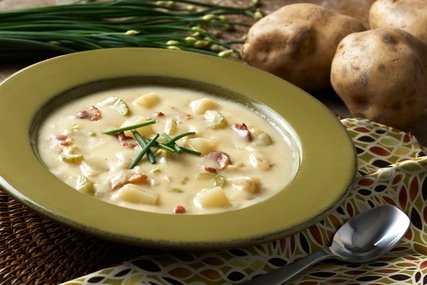
Currywurst and Döner - that's probably the first thing most people associate with Berlin cuisine. And then the diverse streetfood scene with dishes from all over the world. But there is also the very traditional Berlin cuisine with rustic and hearty dishes that fill you up and taste good. In recent years, the chefs who come to Berlin from all over the world have further developed the traditional recipes by giving them a multi-cultural flair and made them known and popular again. So the good old Berliner Weiße (a light beer with sweet syrup) is back in fashion ...
We've rummaged through old cookbooks and the Internet and have put together a few recipe suggestions for you to try at home, including some with such beautiful names as Hoppel-Poppel, Fake Rabbit or Proud Heinrich.
Most of them are easy to prepare and certainly an original addition to your meal plan - espicially now in the Christmas season.
And for those who prefer vegetarian and less hearty dishes, you'll find great recipe ideas in our blog about streetfood without street.
Have fun cooking. If you have any suggestions, we'd love to hear your comments.
Tip 10: Boulette mit Kartoffelsalat (Meat balls with potato salat)
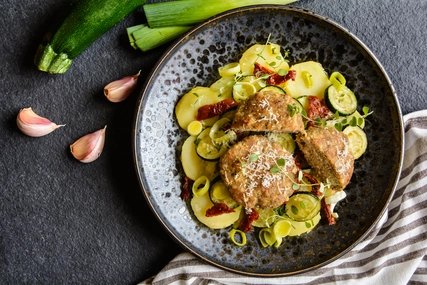
Boulette or Bulette (meatballs) is the typical Berlin pub food, a hearty accompaniment to a beer. And at least in the classic corner pubs, you can also order Soleier (eggs pickled in vinegar) with them.
Meanwhile you can also get them in many varied variations, for example the delicious Beefballs in the Markthalle IX in the flavours Bologna, Bangkok or Bangalore.
To make a typical Berlin boulette, you can should the rolls from the day before. Rolls are called Schrippe in Berlin, not Brötchen, Semmel or Rundstück as in other areas of Germany.
Recipe for Boulette Grandma's way
Tip 2: Hoppel-Poppel
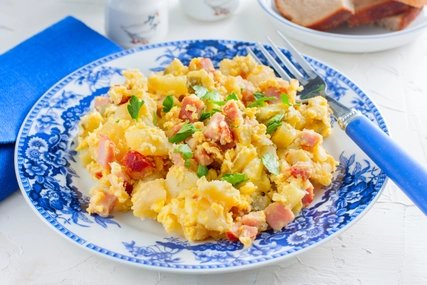
This onomatopoeic name comes from the remnants that otherwise go down the drain. So it is a typical leftover meal with roast leftovers and potatoes, elsewhere also known as Bauernfrühsück (Farmer's breakfast). So it's perfect if you still have potatoes from the day before and don't want to just make baked potatoes again.
Tip 3: Falscher Hase (Fake Rabbit)
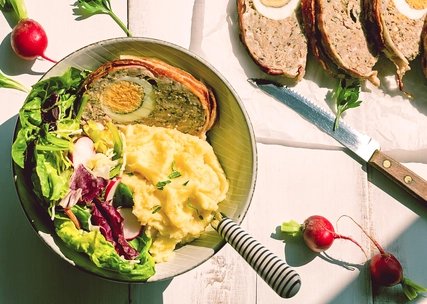
As the name suggests, you don't need a rabbit for this recipe. Instead, the False Rabbit is made of minced meat and hides a boiled egg inside. So it is very suitable for an Easter dinner.
A real recipe for a Fake Rabbit
Tip 4: Stolzer Heinrich (Proud Heinrich)
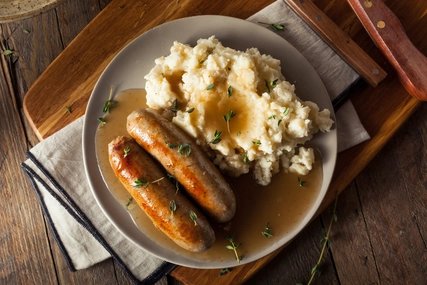
A truly proud name for what is actually a simple meal: sausage with sauce. But probably the poor Berliners used to be really proud when they could put a piece of meat on the table.
By the way, there is actually a fake Wilhelm, too, but that is a fake plait of hair and nothing to eat.
Tip 5: Teltower Rübchen (Turnips from Teltow)
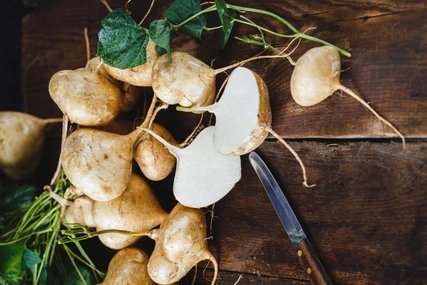
You can prepare the small turnips from Teltow as a delicious side dish or eat them raw in al salad. They actually only grow on the loamy sandy soils in Teltow and are therefore a true regional speciality from Brandenburg. Napoleon brought them to France, and Goethe, Kant and Fontane also appreciated them.
Tip 6: Berlin Potato soup

If it's cold outside again, warm up a potato soup. Probably every family in Berlin has its well-kept, the one and only true recipe for a potato soup with a long tradition. After all, Frederick II already established the cultivation of potatoes in Prussia - by so-called Potato Order. Maybe you will create your family potato soup recipe for your descendants.
Inspiration for a Berlin potatoe soup
Tip 7: Königsberger Klopse (Königsberg Meat balls)
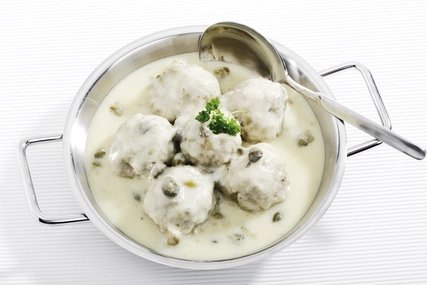
Many of the traditional dishes came with the people coming to the city, such as the Huguenots or Silesians, and as they became Berliners, their food also entered the Berlin kitchen. A typical example is the hearty Königsberger Klopse (meatballs), which are traditionally served in Berlin on Sundays. And it is also the favourite dish of star chef Tim Raue.
Tip 8: Berlin liver with apple and onion
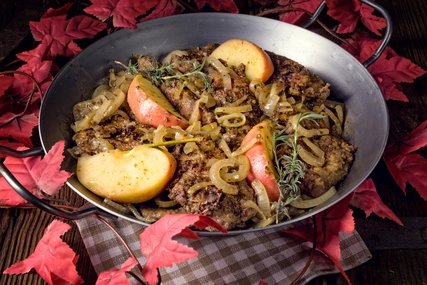
Well, not everyone likes liver, but if you feel like it, it tastes especially good in the Berliner style with braised onions and apples and with fine, homemade mashed potatoes.
Tip 9: Kassler mit Sauerkraut (Smoked pork with sauerkraut)
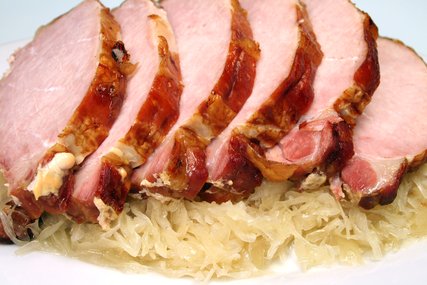
And another typical meal is the Kassler, i.e. salted and smoked pork. It is also a typical winter meal, hearty and nutritious. But especially in these times, a warming comforting soul is especially delicious.
Recipe für Kassler mit Sauerkraut
Tip 10: Eisbein mit Erbspüree (Knuckle of pork with green pea puree)
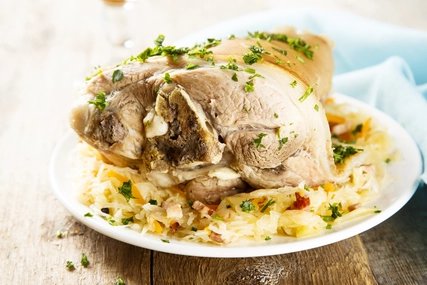
The classic of Berlin cuisine! It sounds quite hearty and it is. Where the name comes from is not clear. Either because the white fat looks like a layer of ice or because it is eaten especially in icy temperatures in winter. Maybe also because the first skates were equipped with bones as runners, that's why skates are called "isläggor" in Swedish, which means icebones.
In any case, it is a piece of knuckle with a layer of fat under which you find fine cooked meat (that's the delicious part you eat). It is usually served with Sauerkraut and in Berlin, instead of mashed potatoes, homemade green pea puree.
Recipe for Eisbein mit Erbspüree
Tip 11: Berliner Luft
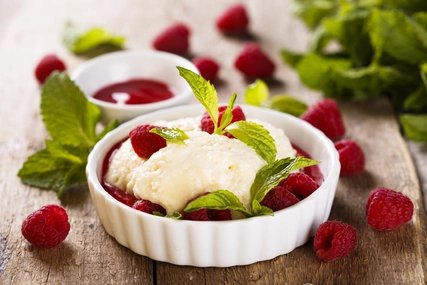
“Ja, ja, ja, das ist die Berliner Luft, Luft, Luft, so mit ihrem holden Duft, Duft, Duft, wo nur selten was verpufft, pufft, pufft”: The best thing is to hum along with this old Berlin song when you conjure up this fine dessert. The cream with raspberry sauce is very easy to prepare and really delicious, even if it is in the shadow of the more famous desserts like Bavarian cream or Crema Catalana.
And not to be missed: Pfannkuchen
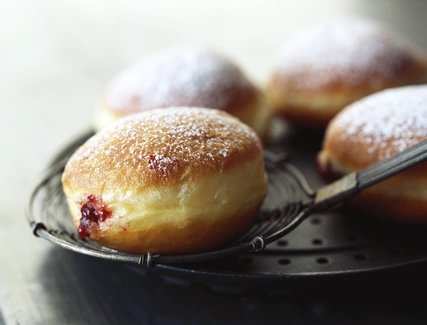
We have already introduced the Pfannkuchen to you in our Streetfoodblog, but of course they also belong to the classic Berlin cuisine. Important: In Berlin it's called Pfannkuchen - never Berliner like in the rest of Germany. It's more like a donut than a pancake, but the classic pancake is called Eierkuchen in Berlin. Traditionally they were served on New Year's Eve and carnival, but now you can get them at the baker's all year round.



